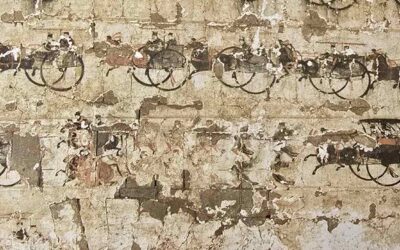Zhou Yanxian. Two Thousand Zhuang Proverbs from China with Annotations
and Chinese and English Translation. 2017 Peter Lang Publishing, Inc., New York. 2016
If in other post I introduced a translation of the most solemn texts of the Zhuang Nationality, the myths translated by David Holm, here I do the same with other book dealing with a very different literary pieces: proverbs. Both myths and proverbs are reflections of a people’s soul, while the first are used by the religious specialists in very concrete environment, the last are part of everybody knowledge, and transmitted from parents to sons, are a part of a kind of common wisdom that oils the life of the community, including customary law and education, production practices, religious taboos and references to mythical and historical episodes.
In this web I have published several posts dealing with the proverbs of different ethnic groups of China and now I am very happy to introduce this beautiful book to the readers.
I have selected and published here three short fragments from the book introduction, eleven samples of the proverbs, and the table of contents. I think that reading these texts, every visitor of this web will have an accurate idea of the contents and quality of the book.
- Three excerpts from the Introduction
In the summer of 2013, I started a National Social Science Project of China
titled “A Comparative Study of Zhuang and Thai Proverbs” (Project Number:
13XYY021). This project is meant to be a comprehensive comparative study
of linguistic and cultural practices of Zhuang and Thai proverbs based on the
knowledge and theories of linguistics, literary studies, aesthetic studies, historical studies, folklore, anthropology and other disciplines. During the work of
collecting, sorting, and analyzing Zhuang proverbs, I discovered, surprisingly
enough, a rich treasure of Zhuang proverbs and realized my work would be
daunting. These proverbs carry the Zhuang people’s long history and deeply
rooted culture in them and include many topics, different forms, and linguistic features. Thousands of years of traditional Zhuang society have made the
proverbs a cultural marker and an ethnic signifier. The present volume, Two
Thousand Zhuang Proverbs from China with Annotations and Chinese and English
Translation represents a different approach to Zhuang proverbs and adds to my
early research.
Many proverbs introduce the Zhuang’s knowledge of nature,
work, and life, condensing the wisdom they have learned during their lives
into short sayings. Proverbs reflect Zhuang traditional views, thoughts and
feelings as well as religious beliefs.
Two Thousand Zhuang Proverbs from China with Annotations and Chinese
and English Translation is meant to be a corpus for the study of the Zhuang
ethnic group. Scholars, students and others who are interested in Zhuang
language, culture and oral traditions, and especially proverbs will find this
volume useful.
- A short sample of the proverbs in this book.
- Ndaw ranz mbouj huzndei, naz biz bienq reih byom.
家庭不和气,肥田变瘦地。
A disharmonic family turns a fertile field into a thin one.
1003. Ndoeng ndei hwnj faex soh, boh ndei miz lwg ndei.
好林长直树,好父生好儿。
A good forest grows straight trees, a good father has good children.
1004. Ngoenzneix bae doj, ngoenzcog bok buh.
今天赌博,明天剥衣。
Gambling today, selling clothes tomorrow.
1005. Ningznyienh haq bouxhuk gaenx ndaemnaz, mboujnyienh haq miz cienz gik youq ndwi.
宁可嫁憨厚庄稼汉,不愿嫁有钱懒闲人。
Better to marry a simple and honest peasant than a rich but lazy man.
1006. Nit mbouj genj buh, gungz mbouj genj yah.
寒不择衣,贫不择妻。
He who feels cold is not choosy about his clothes, he who is poor is not choosy about his wife.
1007. Nyengh aep gyaeujvaiz mbouj gwn raemx, caeux mbaet lwgmak feih mbouj van.
强压牛头不喝水,早摘果子味不甜。
Push down the ox’s head but you can’t make it eat grass, pick up the unripened fruit but it is not sweet.48
1008. Nyienh cek cib aen miuh, mbouj cek ranz vaen ndeu.
宁拆十座庙,不拆一家婚。
One prefers to pull down ten temples than to break up a marriage.
1009. Nyienh gai naz ranzcoj, mbouj gai vah siencoj.
宁卖祖上田,不卖先祖言。
Rather sell the ancestral fields than sell the ancestors’ mottos.
1010. Ra bawx cam vunz ranz daiq, dwk laeuj cam boux dawz huz.
讨亲问娘家人,打酒问提壶人。
Ask the girl’s parents before you marry her, ask the pot holder before you buy the wine.49
1011. Raemxdah nanz goenq cingz, faexbyauh nanz gek yaem.
江水难断情,篱笆难隔音。
Water cannot stop true love, a fence cannot contain people’s voices.
ndaw ranz 家庭 family 101
1012. Raen nywj in daengz vaiz,raen ngaiz in daengz lwg.
见草疼到牛,见饭疼到崽。
See the grass and think of oxen, see the rice and miss the children. - Contents
Preface vii
Introduction xv
Chapter 1. Saeh Leix 事理 Truths 1
Chapter 2. Coih Ndang 修养 Morality 47
Chapter 3. Ndaw Ranz 家庭 Family 77
Chapter 4. Gwndaenj 生活 Everyday Life 105
Chapter 5. Doxgyau 社交 Social Life 129
Chapter 6. Guh Hong 生产 Labor 147
Chapter 7. Gwnzbiengz 自然 Nature 197
Chapter 8. Mbanj Ranz 乡土 Customs 209
Chapter 9. Haenh Guek 时政 Politics 215
Glossary 221
Notes 229
Index 249
Last posts
Why I devoted more than a year to researching suicide in Chinese culture
Why I devoted more than a year to researching suicide in Chinese culture In early November 2022 my friend, the psychiatrist Luz González Sánchez, told me that she was preparing a lecture on suicide. On the 8th of that same month, during a quiet moment, I made a brief...
The Kumbum of Gyantse and the secret of the ancient Buddhist temples
The Kumbum of Gyantse and the secret of the ancient Buddhist temples Almost everyone who visits Tibet with enough time includes Gyantse in their itinerary, and in this city, a visit to its famous Kumbum. This pyramidal building fascinates travelers with the exuberance...
The Tibetan Deity with a Horse Face
The Tibetan Deity with a Horse Face During my most recent journey to Tibet, someone pointed out to me in a temple a deity who bore a small horse upon his head. I knew that this protector is called Hayagriva, and that he is sometimes referred to as “Horse-Headed” or...







